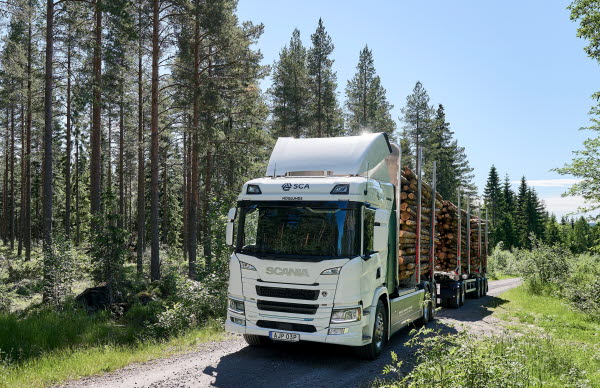SCA has, together with Scania, developed the world’s first electric timber truck with a capacity of 80 tonnes. SCA’s goal is to make the entire value chain fossil-free. “We have come a long way in industrial processes, which are already 96 percent fossil-free. We are very pleased that we together with Scania can break new ground to make the heaviest transports fossil-free,” says Hans Djurberg, Head of Sustainability at SCA.
The world’s first electric timber truck with a capacity of 80 tonnes has now been delivered to SCA. The vehicle solution developed by Scania in close collaboration with SCA and the research institute Skogforsk, is part of the transition to sustainable transport.
“The 80-tonne battery-powered timber truck shows that even really heavy transport can be electrified. The partnership with SCA, is a early show of what is possible, is a clear signal that it is possible to electrify even heavy transport. A change of pace is needed to make Sweden fossil-free in time and meet the goal of the Paris Agreement,” says Fredrik Allard, Head of E-mobility at Scania.
“An electric timber truck is a symbol of something pretty cool. Shipping of timber has been talked about as something that might never be possible to electrify. The development in recent years and what we are now presenting together with SCA shows how fast the development is taking place both in terms of vehicles and batteries,” says Allard.
The intention is that the vehicle will transport timber on the stretch between SCA’s timber terminal in Gimonäs and the paper mill in Obbola outside Umeå. The new electric timber truck represents another innovative step on the journey towards a fossil-free society and can be driven with a total weight of 64 tonnes on public roads and 80 tonnes on private roads.
Test-driven during the summer
SCA Obbola’s paper mill currently has a virtually fossil-free production process and the intention of the new vehicle is to reduce the fossil elements in the transport chain of raw material to the mill.
The electric timber truck will be test-driven during the summer and continuously studied by the research institute Skogforsk to collect relevant data that can form the basis for comparisons with conventional diesel-powered timber transports.
After that, the plan is for it to be included in SCA’s regular operations.
-
That’s a remarkable amount of work hours for a single machine, the Norcar 600 owned by Erkki Rinne is taken well care of, it even has the original Diesel engine.
-
Kieran Anders is a forestry contractor working in the lake district. His work involves hand cutting and extracting timber using a skidder and tractor-trailer forwarder.
-
It is not possible to eliminate chain shot, but there are simple steps that can be taken to reduce the risk.
-
Arwel takes great pride in the fact that the mill has no waste whatsoever, “the peelings are used for children’s playgrounds, gardens and for farm animals in barns in the winter and the sawdust has multiple uses in gardens and farms as well.
-
Timber hauliers need to encourage young blood in, and also look after the hauliers we have, we need make the sector a safe and positive place to work.
FIND US ON
Related Posts
High climate ambitions
“This is a first concrete step towards electric propulsion in the most difficult part of the landborne transport chain, which is extremely important. This is a global challenge that many have wrestled with and now we are showing together with an innovative partner, Scania, that Swedish industry can drive sustainability development,” says Hans Djurberg.
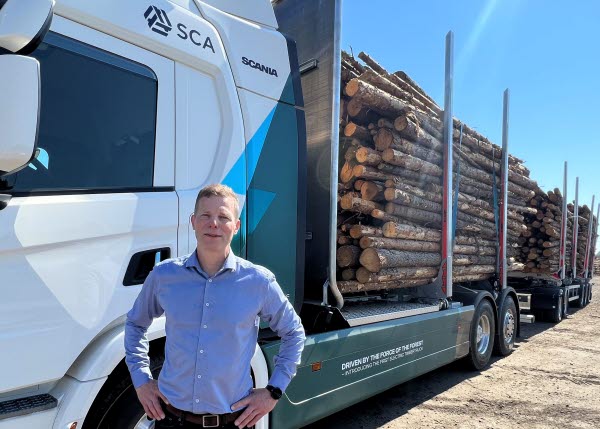

“Sustainability and reduced carbon dioxide emissions are important for society as a whole, which means that the business is also dependent on us driving development. Our forests and forest products have created enormous climate benefits for a long period of time and our industries are very climate-efficient, which is why it is also obvious with high climate ambitions for our transports,” says Hans Djurberg.
The studies carried out during the summer will, among other things, compare energy consumption, productivity and costs against existing vehicles and map out what would be required for a broad implementation of electric timber trucks across the country.
Believe in electric timber trucks
Jörgen Bendz, Industrial Supply Manager at SCA, notes that the ability to electrify the heaviest transports has great potential for the company’s sustainability work.
“We have worked hard and successfully towards fossil-free energy in our industries and we also have a significant part of our transports by rail, so we have been very keen to find a fossil-free solution for the heavy transport with raw material that goes to the industry by truck. We hope and believe that electric timber trucks over time can become the key to solving this challenge,” says Jörgen Bendz.
Facts and figures
- By running just one electric truck between Gimonäs and Obbola, SCA can reduce our carbon emissions by about 55,000 kg per year.
- 6 turns/day Gimonäs wood terminal- Obbola paper mill, Monday-Friday 07:00-17:00
- Distance: ca 30 km round-trip
- Time: 75 min per trip (both loading and unloading)
- The truck is loaded with an ABB charger of 180 Kw at Obbola paper mill.
Forest Machine Magazine is written and edited by a forest professional with over 40 years hands on experience. We are dedicated to keeping you informed with all the latest news, views and reviews from our industry.
To support us you can subscribe to our bi-monthly magazine which is delivered to your door from only £30 per year.
Subscribe here
#homeoflogging #writtenbyloggersforloggers #loggingallovertheworld
-

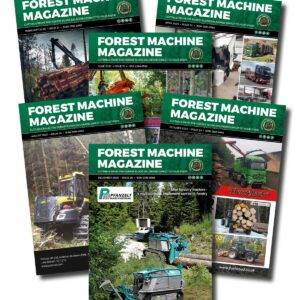 1 Year Subscription£0.00
1 Year Subscription£0.00 -

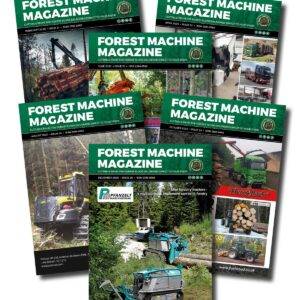 2 Year Subscription£0.00
2 Year Subscription£0.00 -

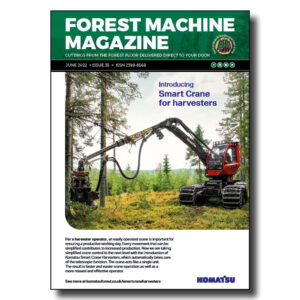 Issue 35£6.00
Issue 35£6.00 -

 Sustainable Logging: Powering The Planet T-Shirt£17.50 – £20.00
Sustainable Logging: Powering The Planet T-Shirt£17.50 – £20.00 -

 Sustainable Logging: Powering The Planet Hoodie£33.00 – £36.00
Sustainable Logging: Powering The Planet Hoodie£33.00 – £36.00

